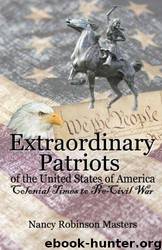Extraordinary Patriots of the United States of American: Colonial Times to Pre-Civil War by Nancy Robinson Masters

Author:Nancy Robinson Masters
Language: eng
Format: mobi
Tags: Colonial Period (1600-1775), Military, History, United States, Revolutionary Period (1775-1800)
ISBN: 9780937660911
Publisher: AWOC.COM
Published: 2010-10-15T06:00:00+00:00
Henry Knox
The “Ox” of the Revolutionary War
1750-1806
He is too valuable to me.
—General George Washington
Henry Knox looked up from the manual of military strategy he was reading in his Boston bookstore in 1774. The young woman who had just entered was the daughter of a devoted British Loyalist, and Knox knew her father did not want her in his store. She had, in fact, been told that she must choose between her family and her love for Knox, who was a poor shopkeeper and a member of Massachusetts’s rebel militia (citizen soldiers). Unknown to her father, the choice had already been made. Henry Knox and Lucy Flucker had secretly wed, and they were ready to join other young patriots in the battle for America’s independence.
Henry Knox was born on July 25, 1750, the seventh of ten children born to William and Mary Campbell Knox. His father was a shipmaster who died when Henry was nine. With limited education and no money, Henry went to work as a clerk in a bookstore when he was about twelve years old to help support his family. His love of reading led him to open a bookstore of his own when he was twenty.
After the battles of Lexington and Concord in Massachusetts in the spring of 1775, Knox left his bookstore and joined other volunteers fighting the British at the Battle of Bunker Hill, also in Massachusetts. The loss of two fingers on his left hand in a hunting accident several years earlier did not slow him down in this first large-scale battle of the American Revolution. His gallant service earned him the rank of colonel from General George Washington, who was impressed with the tremendous knowledge of artillery (heavy guns and cannons) that Knox had gained through reading. He presented a daring plan to Washington: Bring the cannons that Ethan Allen had helped capture at Fort Ticonderoga, New York, near the Canadian border, to Boston. Everyone warned Washington that Knox’s plan to move fifty-nine cannons weighing sixty tons almost three hundred miles through rough territory was impossible. Desperate for artillery, Washington agreed to Knox’s plan.
Knox set out in November 1775, when heavy snow covered the ground. With two thousand men, forty-two sleds loaded with the cannons, and four hundred oxen pulling them, he arrived on March 4, 1776, at Dorchester Heights in Boston. Two weeks later the British abandoned the city, and twenty-five-year old Knox became a national hero.
Washington often turned to Knox to help find money to pay the soldiers when the Continental Congress had none. On one occasion Knox obtained fifty thousand dollars from the businessman Robert Morris. On other occasions he persuaded the citizens of the New England colonies to provide supplies to keep the Continental army fighting. “Knox could solve problems as quickly as he consumed bread,” fellow officers teased, referring to Knox’s weight of more than 250 pounds.
On Christmas night of 1776, Knox stood in the darkness on the shore of the Delaware River and, using only his voice,
Download
This site does not store any files on its server. We only index and link to content provided by other sites. Please contact the content providers to delete copyright contents if any and email us, we'll remove relevant links or contents immediately.
| African Americans | Civil War |
| Colonial Period | Immigrants |
| Revolution & Founding | State & Local |
Cat's cradle by Kurt Vonnegut(13866)
Pimp by Iceberg Slim(12931)
Underground: A Human History of the Worlds Beneath Our Feet by Will Hunt(11256)
4 3 2 1: A Novel by Paul Auster(11047)
The Radium Girls by Kate Moore(10907)
American History Stories, Volume III (Yesterday's Classics) by Pratt Mara L(4825)
Perfect Rhythm by Jae(4621)
Wiseguy by Nicholas Pileggi(4585)
The Fire Next Time by James Baldwin(4342)
Paper Towns by Green John(4169)
A Higher Loyalty: Truth, Lies, and Leadership by James Comey(4032)
Pale Blue Dot by Carl Sagan(4001)
The Mayflower and the Pilgrims' New World by Nathaniel Philbrick(3911)
The Doomsday Machine by Daniel Ellsberg(3730)
Too Much and Not the Mood by Durga Chew-Bose(3693)
Killers of the Flower Moon: The Osage Murders and the Birth of the FBI by David Grann(3608)
The Borden Murders by Sarah Miller(3590)
The Sympathizer by Viet Thanh Nguyen(3478)
Killing England by Bill O'Reilly(3454)
